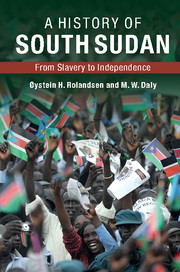Book contents
- Frontmatter
- Contents
- Preface
- Chronology
- List of abbreviations and Arabic terms
- Map
- 1 Introduction: the land and peoples of the upper Nile
- 2 Ivory and slaves: the nineteenth century
- 3 The second Turkiyya, 1898–1953
- 4 The curse of colonial continuity, 1953–1963
- 5 The first civil war, 1963–1972
- 6 Regional government: from one civil war to another, 1972–1983
- 7 Eclipsed by war, 1983–1991
- 8 Factional politics, 1991–2001
- 9 Making unity impossible, 2002–2011
- 10 Independent South Sudan
- Bibliographical essay
- Index
6 - Regional government: from one civil war to another, 1972–1983
Published online by Cambridge University Press: 05 June 2016
- Frontmatter
- Contents
- Preface
- Chronology
- List of abbreviations and Arabic terms
- Map
- 1 Introduction: the land and peoples of the upper Nile
- 2 Ivory and slaves: the nineteenth century
- 3 The second Turkiyya, 1898–1953
- 4 The curse of colonial continuity, 1953–1963
- 5 The first civil war, 1963–1972
- 6 Regional government: from one civil war to another, 1972–1983
- 7 Eclipsed by war, 1983–1991
- 8 Factional politics, 1991–2001
- 9 Making unity impossible, 2002–2011
- 10 Independent South Sudan
- Bibliographical essay
- Index
Summary
The Addis Ababa Agreement embodied the unprecedented decision that South Sudan was to have a parliament, a president, a cabinet, and an administration of Southerners. The politics surrounding the establishment and administration of the Southern Regional Government became the dominant theme of the ensuing period. The period 1972–83 later tended to be seen as a hiatus of calm during which the parties caught their breath before the next bout of warfare. Yet this was not a period of tranquility but one of “no peace no war.” The regional government was an elite project of a small class of politicians and administrators in Juba, and political tension, uncertainty, insecurity, repression, and violence continued to mar the everyday life of many South Sudanese.
Within five years of the Agreement, optimism had given way to fatalistic expectation of renewed war. It had soon become evident that autonomy was an illusion, that only a minimal amount of actual power would be vested in the regional government, and that a mere fraction of the promised economic transfers would ever reach Juba. Even more problematic was the anomaly of Southern democracy within a one-party state under military dictatorship – a system echoed later in the vexed relations between Beijing and Hong Kong. In essence, the success of the Addis Ababa Agreement depended almost entirely on the ability and willingness of President Nimeiri to execute it. The period 1980–3 witnessed a crash in slow motion: southerners saw impending disaster but were unable to prevent it.
It would later become clear, however, that this era of regional government was crucial in the making of independent South Sudan. Despite all that came after, it gave proof that autonomy of the type proffered at Addis Ababa was unworkable and thus prepared the ground for the CPA in 2005. Although the flimsiness of the Addis Ababa arrangements and the disappointments related to its implementation – “too many agreements dishonored” – have been presented as instructive, at a more fundamental level we may discern in this period of institutional politics the shaping of South Sudan as a polity.
- Type
- Chapter
- Information
- A History of South SudanFrom Slavery to Independence, pp. 93 - 104Publisher: Cambridge University PressPrint publication year: 2016



